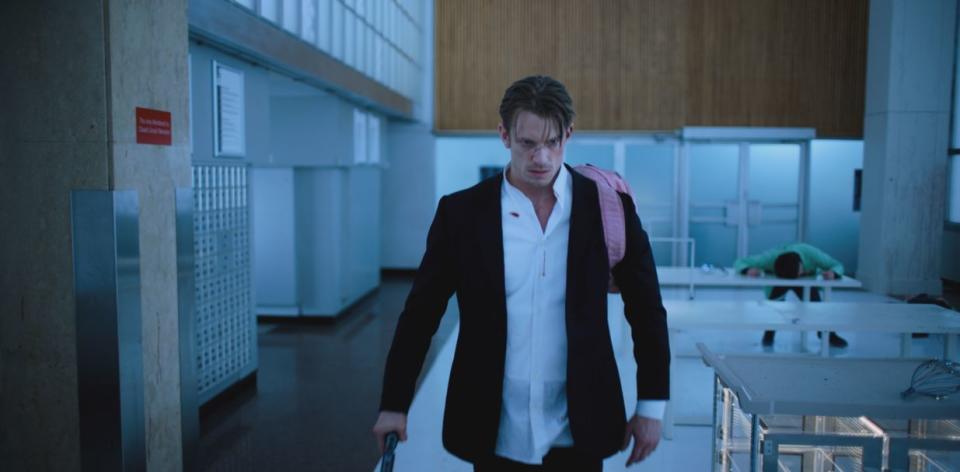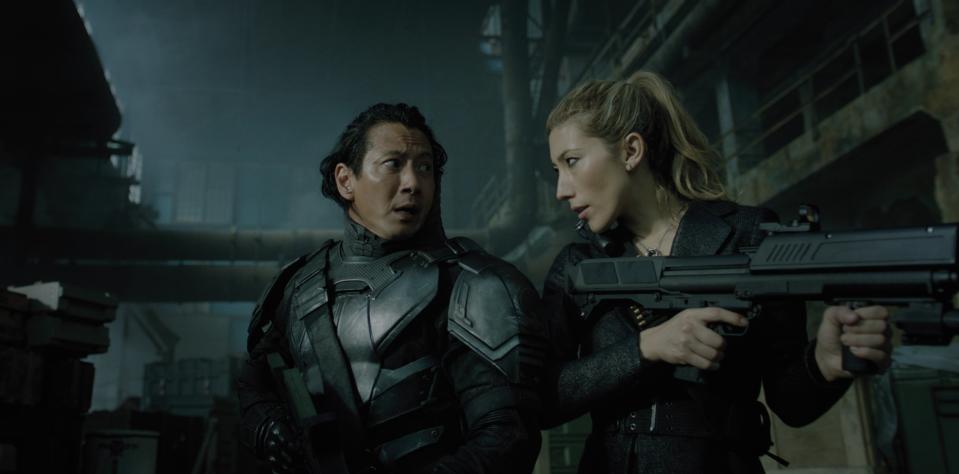Altered Carbon: The one change that would fix its race dilemma

When you hear the character name Takeshi Kovacs the last actor that comes to mind to play the role is Joel Kinnaman, but that is the situation we’re in with Altered Carbon and there’s good reason for it.
Netflix’s new series is based on Richard K. Morgan’s 2002 novel of the same name, set in a dystopian San Francisco (now called Bay City) of the 25th century, where people are capable of living forever by downloading their consciousness to a disc and transferring it to any number of bodies (or as they call them, ‘sleeves’).
This means that a 47-year-old woman’s mind could be put into the sleeve of a 20-year-old girl, a 80-year-old man’s mind put into the sleeve of an eight-year-old boy or, in Takeshi Kovacs’ case, the mind of a man of Japanese and Eastern European heritage put into the sleeve of a Caucasian man.
For the series, Kinnaman plays the Caucasian form of Takeshi, with Will Yun Lee playing the original through flashbacks, but while this casting stays aesthetically faithful to the book that doesn’t mean the show escapes the white-washing criticism.
In the book Takeshi is a former Envoy – an elite soldier working for the U.N. in a military unit that are universally feared – who becomes a criminal mercenary and is captured, killed and digitally stored in the prologue.

He awakens years later to find himself in the body of Elias Ryker, a white, Bay City police officer who is a jarring sleeve for him to wear. “I stood there and towelled myself dry getting used to the face,” Takeshi says on page 41 of the book. “It was basically Caucasian, which was a change for me.”
Through his work as an Envoy, Takeshi has worn many sleeves but it is clear he prefers to wear ones that are closer to his own heritage and through his internal monologue the reader is aware of how uncomfortable he feels in the white body of Ryker.
“I went to the wall and stared up at the floating sleeve. Slim, hard looking, and brown, with the delicately lifted Japanese eyes on the shelf of unscalably high cheekbones, a thick, straight drift of impenetrably black hair like seaweed in the tank fluid…It was like looking at myself under glass,” he says on page 642.
“The self I’d built somewhere in the coils of memory that trail all the way back to childhood. Suddenly I stood, exiled into Caucasian flesh, on the wrong side of the mirror.”
Later, on pages 840-841, Takeshi continues to share his misgivings: “In a wood-panelled toilet somewhere, I stared into a fragmented mirror at the face I was wearing as if it had committed a crime against me. Or as if I was waiting for someone else to emerge from behind the seamed features.”

The battle between Takeshi’s inner and outer selves in the TV series, are barely touched upon with Kinnaman playing the character. The viewer looks at him, listens to him and watches his mannerisms but deciphers nothing of the internal turmoil the Envoy goes through in the book.
It even seems that the Swedish actor was also in charge of creating the gestures, facial expressions and tone of the character despite the fact that his version was just a shell of the original. An original who also happened to be a totally different race to him.
“Since I’m the one that has been doing it the most, by far, I think it’s more been them coming to me and asking if there’s some little thing that I do. So there’s a couple mannerisms that I shared with them,” Kinnaman told io9.
One would think that as Kinnaman is technically playing an Asian man he would defer to his Asian co-stars but it does look like he is playing Takeshi in his own Caucasian way. However, showrunner Laeta Kalogridis could have avoided any further white-washing criticism if she had changed one thing: the voiceover.
Across all ten episodes, Kinnaman provides a sombre and somewhat pretentious narration as Takeshi but it doesn’t make sense that it is his particular voice that is used. Remember, Kinnaman’s body is not that of the Envoy, it is of Ryker’s therefore the narrator should have been Will Yun Lee.
This could have reinforced Lee’s position as the original Takeshi in the viewers’ mind by allowing him to voice the character’s internal monologue, especially as Takeshi’s voice is so integral to the understanding of his personality, feelings and motives in the book.
This is not to say that Altered carbon falls into the Ghost in the Shell realms of white-washing, but this slight change in narration could have allowed for more character development and understanding of the original Asian Takeshi rather than the Caucasian one.
With Kinnaman not expected to return for the second season, it’s certainly something Kalogridis should think about; white-washing can occur in both the aesthetic and psychological sense and future iterations of Takeshi Kovacs should be mindful of this.
Altered Carbon is available on Netflix from Friday February 2.
Read more
Black Lightning goes where other superhero shows fear to tread
Three Billboards success is bad for black representation
Black Mirror challenges the notion of Britishness

 Yahoo Movies
Yahoo Movies 
